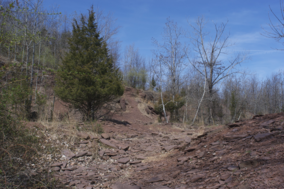| Riker Hill Fossil Site | |
|---|---|
| Walter Kidde Dinosaur Park | |
 | |
Map of New Jersey | |
| Location | Essex County, New Jersey |
| Nearest city | Livingston |
| Coordinates | 40°48′57″N 74°19′36″W / 40.81571°N 74.32668°W |
| Area | 16 acres (6.5 ha) |
| Established | 1970 |
| Designated | 1971 |
Riker Hill Fossil Site (also referred to as Walter Kidde Dinosaur Park) is a 16-acre (6.5 ha) paleontological site in Roseland in Essex County, New Jersey, United States, located at the south western side of the borough at the border between Roseland and Livingston. It is one of the major sites in United States where a large number of dinosaur tracks are preserved. It was declared a National Natural Landmark in June 1971.[1]
History
Originally, the site was part of a 55 acres (22 ha) stone quarry owned by the Kidde company called Roseland Quarry.[2] In 1968, there was a discovery of dinosaur tracks on the quarry. With the news, a 14-year-old, Paul E. Olsen who lived in Livingston, and his friend Tony Lessa started visiting the quarry to study them.[3] Over a period of a few years, they uncovered more than one thousand dinosaur, animal and insect tracks from the Late Triassic and Early Jurassic period.[4]

When the fate of the quarry site became uncertain, the two teenagers came up with a plan to prevent the site from being developed. They made a cast from a footprint of Eubrontes giganteus and sent that to President Richard Nixon to get support.[3] Eventually, the quarry was split. The most productive portion was preserved and donated to the Essex County Park Commission and named after Walter Kidde. The rest of the quarry was later developed into Nob Hill apartments.[2] In June 1971, the preserved site was registered as a National Natural Landmark.[1][5][6]
Currently, the site is now part of the Riker Hill Complex along with Riker Hill Art Park and Becker Park. For many years, the public was allowed to collect fossils at the site,[7] but now access to the site is restricted.[8][9][10][11]
References
- ^ a b "National Natural Landmark summary". NPS. Feb 5, 2004. Retrieved 2009-03-09.
- ^ a b Olsen, Paul E. Fossil Great Lakes of the Newark Supergroup in New Jersey. W. Manspeizer (ed.), 1980, Field Studies in New Jersey Geology and Guide to Field Trips, 52nd Ann. Mtg.New York State Geology Association, Newark College of Arts and Sciences, Newark, Rutgers University, p. 352-398.
- ^ a b Foot Forward. Archived 2009-04-07 at the Wayback Machine State of The Planet Blogs of The Earth Institute at Columbia University. March 11, 2009 - accessed on March 27, 2009
- ^ "The Jurassic in New Jersey, US". paleoportal.org. Retrieved 2009-03-09.
- ^ "Essex Fossil Site Now A Landmark". The New York Times. July 22, 1973. Retrieved 2009-03-09.
- ^ "Trustees Appoint Eight to Named Professorships, Four Are New Chairs". Vol. 20, No. 21. Columbia University Record. March 24, 1995. Retrieved 2009-03-09.
- ^ Garcia, Frank; Donald S. Miller (1998). Discovering Fossils: How to Find and Identify Remains of the Prehistoric Past. Jasper Burns. Stackpole Books. p. 201. ISBN 978-0-8117-2800-3.
- ^ "Riker Hill Complex". Essex County, New Jersey. Retrieved 2009-03-09.
- ^ Browne, Malcolm W. (Nov 2, 1990). "Buried Treasure a Zillion Years Old". The New York Times. pp. C1. Retrieved 2009-03-09.
- ^ "Riker Hill Quarry - Roseland, NJ". Waymarking.com. February 10, 2008. Retrieved 2009-03-09.
- ^ Pollak, Michael (May 11, 1997). "New Jersey Underground: Fossils, Gems and Glowing Rocks". New York Times. Retrieved 2009-03-09.









